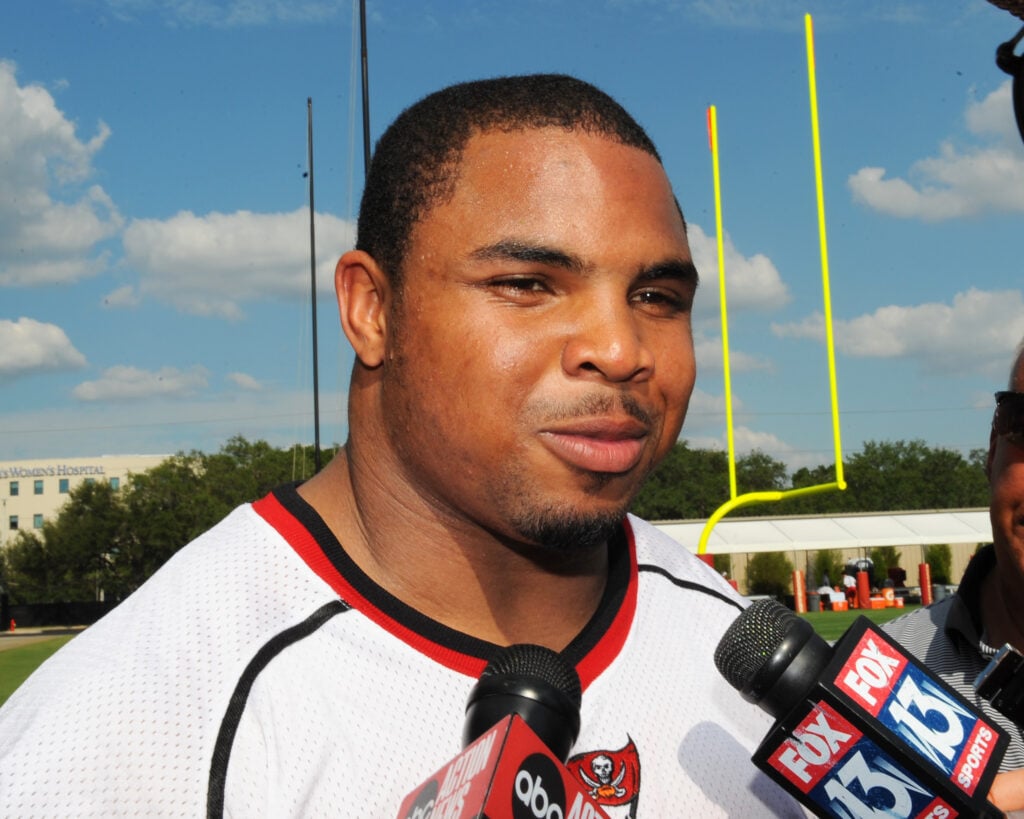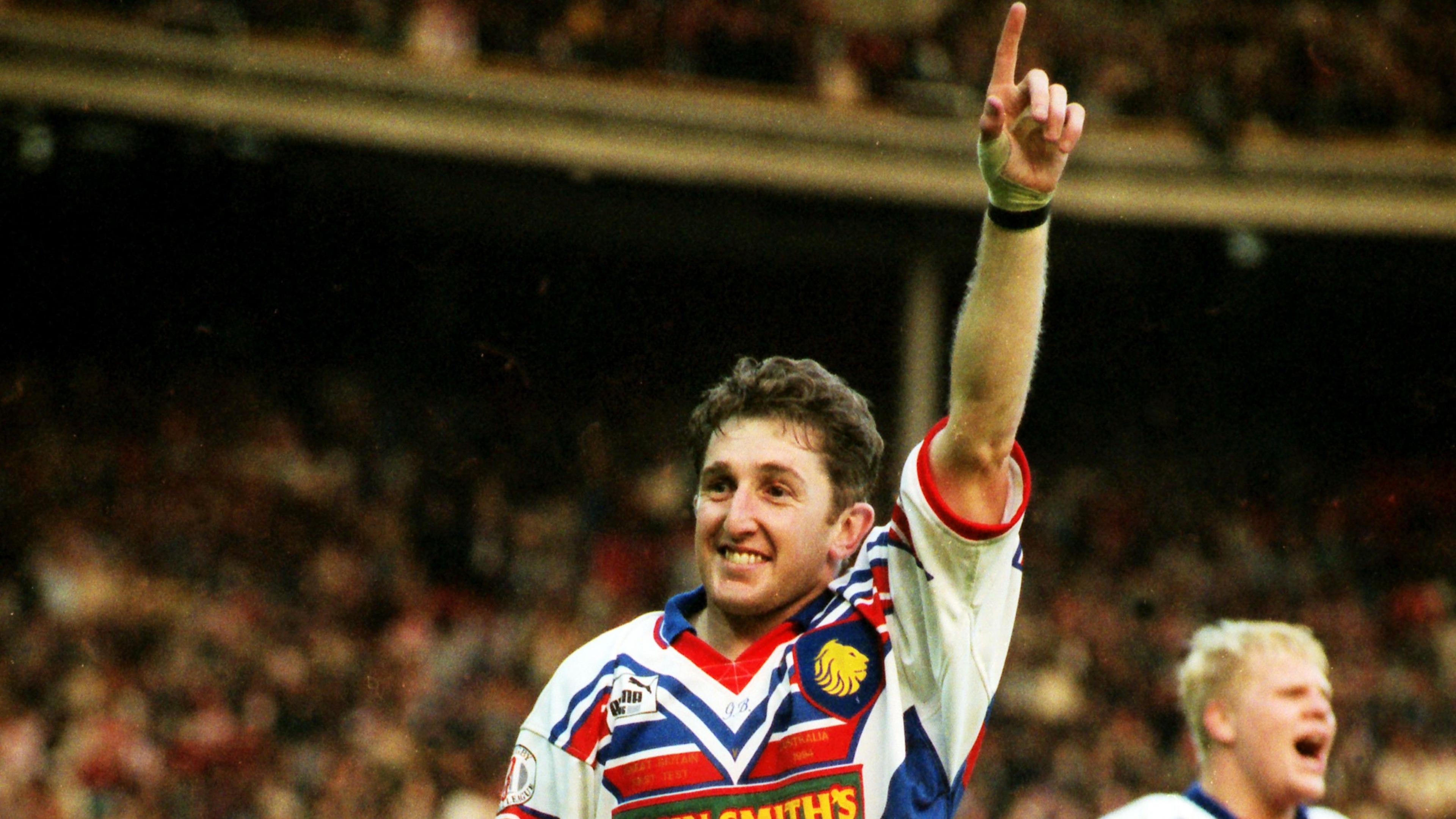 Rex Features
Rex Features-
15 minutes ago
Jonathan Davies has a message for England. “I’d love to see now another try at Wembley so they haven’t got to show mine,” he says.
It is a big challenge for Shaun Wane’s side as they get ready to face Australia in London on Saturday, in the first rugby league Ashes Test since 2003.
Because the try that dual code rugby great Davies scored 31 years ago this week was one of the classics, a stunning 50-metre burst for the corner, in a memorable Ashes victory. Great Britain, playing with 12 men for almost an hour, beat the world champions at Wembley.
That score, on a wet afternoon in October 1994, was a defining moment – for the scorer, for the sport, even for the BBC’s commentator that day.
The triumph it inspired is still heralded now. It’s one that might offer lessons to help Wane’s class of 2025. So how do you compete with the world’s best?
“You have to be patient,” Davies says. “Don’t be chasing it. Don’t be pushing passes. Make sure you have a good kicking game. And keep turning the Australians. And then just hang on in there.
“It’s a fight, really, and then just try to make the most of your opportunities.”
The team of 1994 had plenty of fight. Sometimes a bit too much. But they needed a thirst for battle, because they were up against it from the start.
Rugby League Ashes
25 October, 1 November, 8 November
Wembley, Hill Dickinson Stadium, AMT Headingley
Watch all three Tests live on BBC One, BBC iPlayer and the BBC Sport website and app
‘That was a bit surreal – Ellery was a good pal of mine’
There are several parallels between 1994 and 2025. As then, the Kangaroos arrive as World Cup holders and favourites. The first Test is at Wembley. And the build-up has been overshadowed by a head coach called Mal leaving for an Australian club job.
This time around, Australia lost their boss. Mal Meninga, the captain in 1994, stepped down in June to join new NRL franchise Perth Bears. Kevin Walters – a member of the ’94 touring party, though he didn’t play in the Tests – has stepped in.
“Yeah, I don’t think that’s an issue for Australia,” says Martin Offiah, the legendary winger who was a Great Britain team-mate of Davies in 1994.
“They’ve got Gorden Tallis in as their assistant, their cultural guide, who brings them all together. At international level, with the quality they’ve got, there are probably 100 people they could get to coach Australia and still be quite confident.”
Wind the clock back 31 years and it was Great Britain in the midst of a shake-up.
Just two months before the first Test, Mal Reilly ended his seven-year reign to head down under and join Newcastle Knights.
His replacement was a rugby superstar – but a coaching novice. Ellery Hanley, a three-time Man of Steel, had captained Great Britain in the 1988 and 1990 Ashes series, and had won just about everything in the club game.
He had retired from international rugby, though was still playing for Leeds, where he was also assistant coach. But still only 33, he had never been a head coach.
For those used to playing alongside him, the idea took getting used to.
“That was a bit surreal,” Offiah says.
“Ellery was a good pal of mine; I’d toured with him for the first time in ’88.
“But he was the consummate professional and switched into coaching mode quite easily – as he’d been a leader on the pitch as well.”
Hanley immediately made a significant call – dropping out-of-form captain Garry Schofield, his Leeds team-mate, from the matchday squad for the first Test. And so on Saturday, 22 October 1994, it was Wigan scrum-half Shaun Edwards who led the side.
But less than half an hour into that first Test, the new captain was in big trouble.
‘He’s got to go’
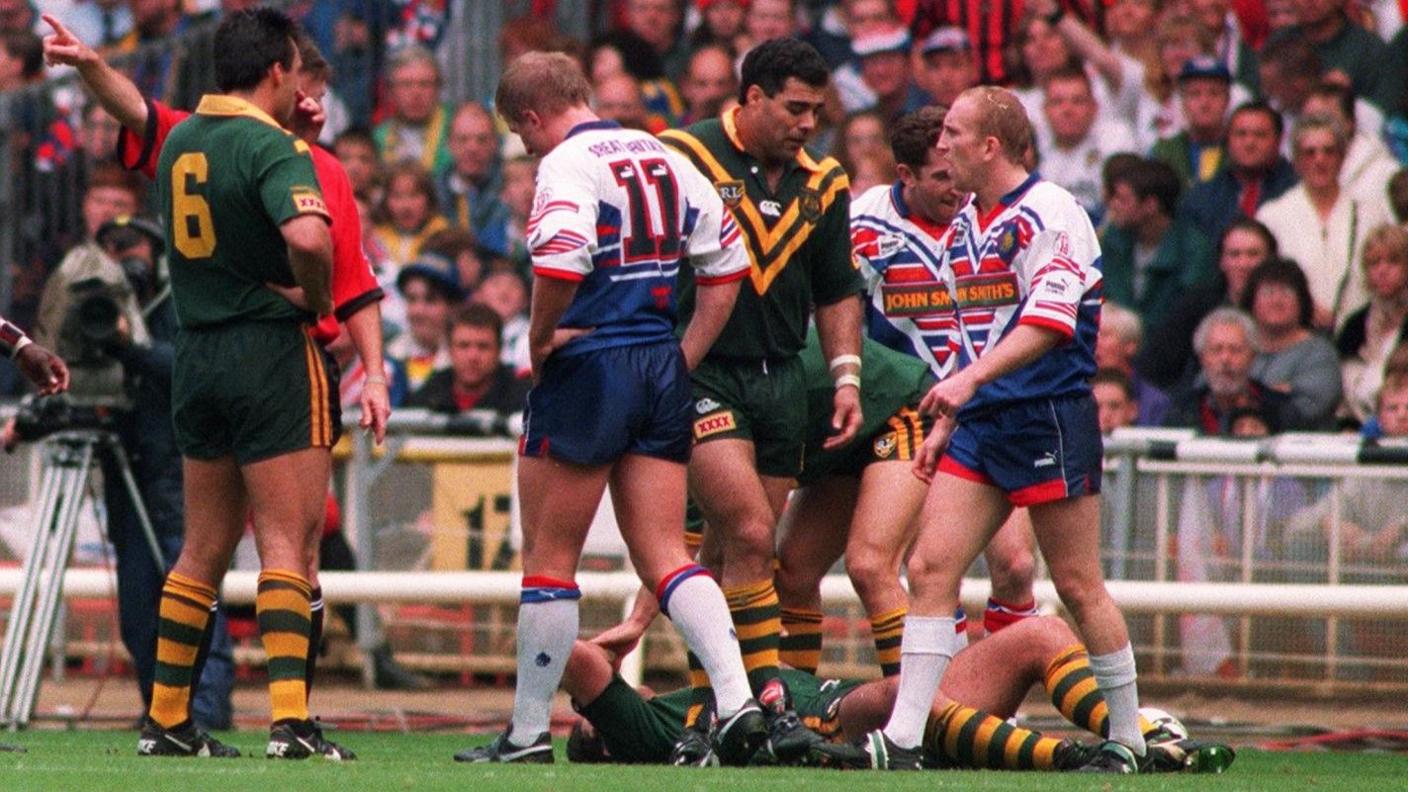 Rex Features
Rex FeaturesAustralia’s team was packed with quality: Meninga and Steve Renouf in the centres, Andrew Ettingshausen on the wing, Laurie Daley at stand-off, Alfie Langer at scrum-half, Brad Fittler at loose forward, plus more.
Britain boasted an abundance of talent too, though: Davies, Offiah, Jason Robinson, Denis Betts, Andy Farrell, to name just a few. They fancied their chances.
But in the 26th minute, their job got much harder. A swift passing move gave Bradley Clyde space to run. Edwards stepped across, right arm outstretched, and poleaxed the Australian second row.
“He’s got to go,” shouted former Kangaroos scrum-half Peter Sterling, summarising for Australia’s Channel Nine. Referee Graham Annesley agreed. A red card for the captain.
Clyde, having been replaced under the blood bin rule that allowed a temporary substitute for an injured player, came back on 10 minutes later and tried to continue.
But he collapsed in the tunnel at half-time and had to be taken to hospital for a precautionary brain scan. Thankfully, he was OK.
Davies says: “I didn’t realise it on the day, but if you watch it on the video, when Shaun Edwards hits him, I think I’m behind, and you can see my face. And I’m thinking: ‘Oof. This is not nice.’
“And that was it, really. Shaun was absolutely distraught. But even in that era, it was a clear sending off.”
A player short, Britain still edged ahead through a Davies penalty. Then, as the clock ticked past 37 minutes, the extraordinary happened.
‘Ten yards out, I knew I’d done him’
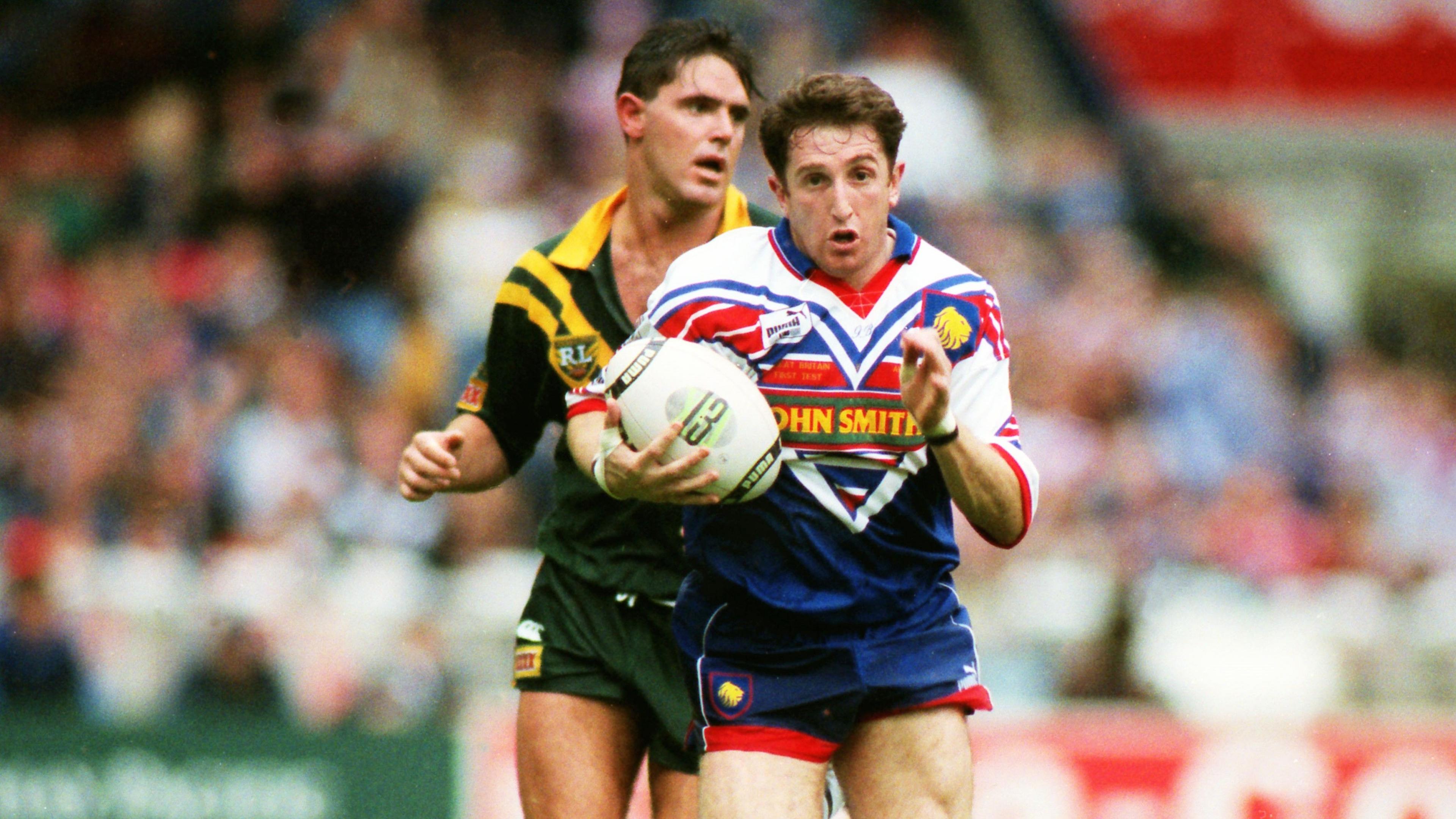 Rex Features
Rex Features“Betts… to Davies! Davies! He’s got some space! He’s going for the corner! He’s got his head back! And the Welshman… IS IN! For a magnificent try at the corner!”
Ray French, BBC TV commentary, 22 October 1994
It started midway inside the Great Britain half. Bobbie Goulding broke from a scrum and set Offiah away, but he was tackled by Australia’s speedy full-back Brett Mullins. From the play-the-ball, Alan Hunte, Goulding and Phil Clarke worked possession right to Betts, who fed Davies on the halfway line with a long way to go.
“I’d noticed that Mullins had got caught up in a little tussle with Alan Hunte at the play-the-ball,” Davies recalls.
“And as the ball came out there was good wide passing, and then I straightened up a little bit and there was a little bit of a dog leg [where the defensive line is not straight], so I just threw a dummy and then all of a sudden I was in space. And it was like slow motion then.
“As soon as I hit the gap, I hit open space. And the noise just hits you. It hits you, but it doesn’t affect you, because it’s like playing as a kid in the field.
“And Brett Mullins was coming over and I knew that if I just checked him a little bit, leaned in with my head, and then accelerated off my left foot, that I’d have a good chance of beating him as he was out of position because of that little tussle he’d had.
“Ten yards out, I knew I’d done him.”
Wembley’s best-ever try? There’s some friendly disagreement there. Six months earlier, Offiah had scored an astonishing length-of-the-field try, finished in the same corner of the stadium, for Wigan against Leeds in the Challenge Cup final.
“I went through Brad Fittler and Steve Renouf, and then outside Brett Mullins,” Davies says. “Martin Offiah always says he scored the best try at Wembley, and I’m going: ‘Hang on, who did you beat, mate? Who did you beat?'”
Offiah recalls: “I always joke to Jiffy that he scored the second-best try ever at Wembley. And he always says that his was against better opposition. But yeah, it was an incredible score. I’d say that’s the moment that Jiffy’s going to be remembered for.”
Viewed in 2025, the try has a touch of poignancy. Ray French, the BBC television commentator who described it so memorably, died in July.
On the night of his death, the BBC One late news ran a short tribute. There was an archive clip: Davies’ try, with French’s words.
“It was a really poignant moment to remember that and remember Ray as well,” Davies says.
‘Davies is having a 10 out of 10 here’
Remarkably, 12-man Great Britain held a 6-0 lead at half-time. Now they had to defend it.
Twelve minutes into the second half, Fittler made a break to within 25 metres of the Great Britain line, with Langer in support and only Davies to beat. Surely the Kangaroos would score now.
Davies had to decide fast: Go to tackle the man with the ball and leave Langer free? Or gamble on Fittler passing and go for Langer?
He went to tackle Langer. It was the right call – saving a certain try.
“Davies is having a 10 out of 10 here,” said Channel Nine commentator Ray Warren.
But the full-back’s afternoon was over within three minutes. In the aftermath of more extraordinary defending – Gary Connolly holding up Fittler virtually over the line – Davies helped scramble the ball clear, but suffered a dislocated shoulder as team-mate Barrie McDermott fell on him.
Still Britain held their lead – only conceding when Renouf scored with eight minutes left. Test debutant David Furner missed the conversion from out wide, to the roars of the Wembley crowd, and the hosts saw the game out, with Goulding adding a late penalty to complete an 8-4 win.
But Davies’ injury had consequences. He missed the remaining two Tests at Old Trafford and Elland Road, which Australia won to clinch the series.
“Barrie McDermott dived on top of me and I popped my clavicle joint,” Davies recalls. “I didn’t play for 10 weeks after. And that was a huge disappointment for me, because I felt with winning at Wembley, we could have won that series.”
‘I’ll take it to the grave that I didn’t win an Ashes series’
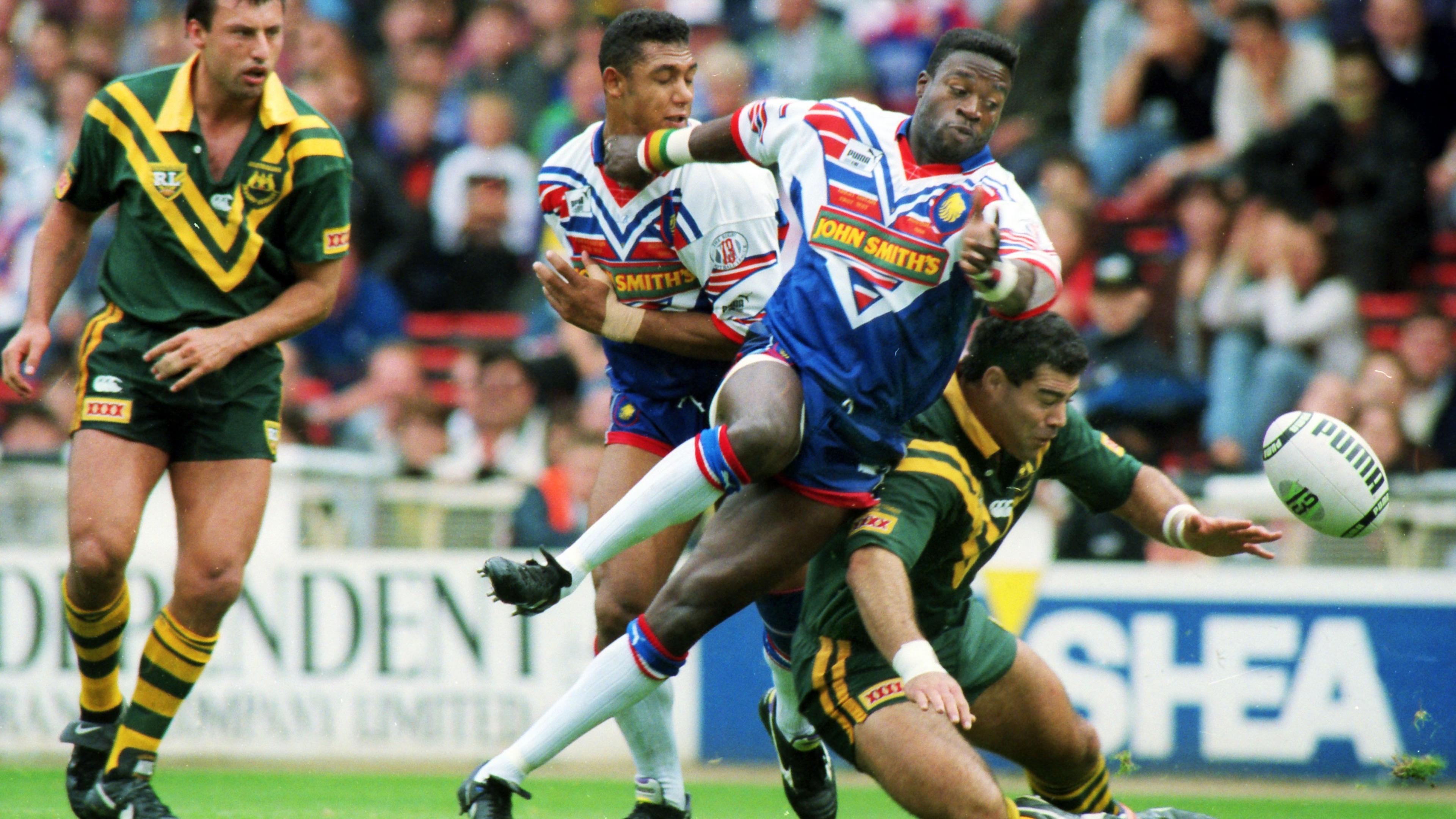 Rex Features
Rex FeaturesHanley moved on in the months after that Ashes series, to play in Australia. Davies returned to rugby union. The squad of 1994 were left with thoughts of what might have been.
As it is, Australia remain unbeaten in an Ashes series since 1970. They haven’t lost one in England since 1959.
There have been memorable individual British victories – in Sydney in 1988, at Wembley in 1990 and 1994, and in Melbourne in 1992 – and a few close calls: Australia had to come from behind to win all three Tests in 2003. But putting it together over a whole series has proved tougher.
“That’s the thing that I’ll take to the grave, that I didn’t win an Ashes series,” Offiah says.
“We’ve had so many fantastic victories against Australia, but for some reason it didn’t happen. Australia still managed to get over the line.”
‘Nothing can build respect for the international game like this’
After a 22-year gap, the Ashes return – albeit with a difference, as Australia will be facing England.
Whether it should be Great Britain, as in every previous series dating back to the origin of the Ashes in 1908, has been a matter for debate.
“Being the traditionalist, I would still like it to be Great Britain,” Offiah says. “It would probably be a similar team anyway, but I think the brand of Great Britain, with the success and the history, probably would give us that extra little bit.
“But there’s nothing that can build the respect for the international game like this.”
‘Anything could happen on the day’
The key to building that respect will be a competitive series.
“Australia will start as favourites,” Davies says. “I think they have to because of the past history of the results. They have the intensity of the NRL competition. But it’s the first one, they could be caught cold a little bit.
“I think anything could happen at Wembley on the day. That’s the one that’s going to set the tone for the rest of the series.”
The hope, for England, is that someone produces a moment to remember.
Offiah adds: “There are a lot of players who want to state their name on the international stage.
“I’d say to all Australian and English rugby league fans, it’s definitely going to be a moment in history.”
Related topics
Disclaimer : This story is auto aggregated by a computer programme and has not been created or edited by DOWNTHENEWS. Publisher: Sports.yahoo.com




